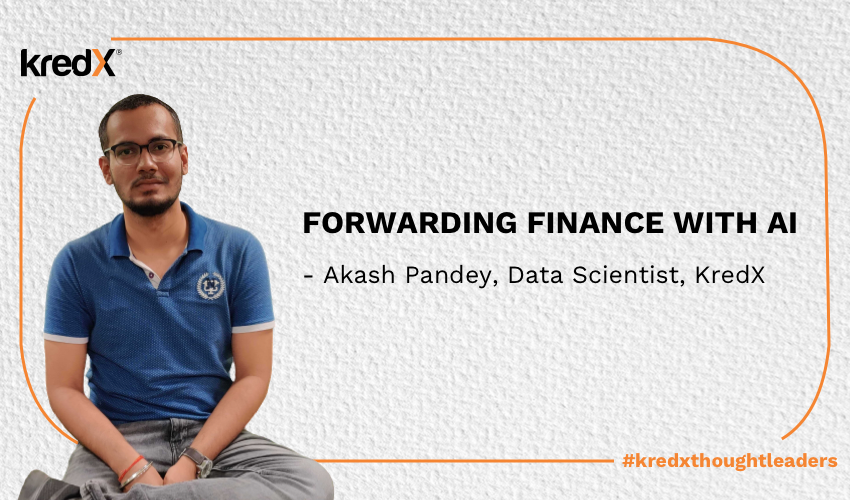
Forwarding Finance With AI
Artificial intelligence (AI) has conquered the tech world by a breeze. It has been increasingly utilised in the fintech space and has automated almost every internal process, boosting the bottom line. In light of the same, we spoke to Akash Pandey, Data Scientist, KredX, about how the amalgamation of AI and fintech has revolutionised the entire sector and here’s what he had to say.
According to Elsewhen’s recent report, ‘From Generative AI to Generative UI,’ modern finance is increasingly driven by technology. The widespread adoption of data-driven decision making has accelerated AI development at an incredible pace.
AI techniques are used to mimic human-like decision making. Due to the availability of a high volume of historical financial data, AI has found its application in credit scoring, quantitative trading, banking, fraud detection, loan approval, and asset management.
Let’s expound on some of the most prominent applications of AI in finance.
Quantitative Trading
Many trading processes can be automated with the help of parameters such as prices, volume, and time fed to computer programs that act according to certain constraints and predetermined logic. The statistical techniques used to this end can learn multiple markets’ behaviour in real-time, thereby providing businesses with a competitive edge.
Multinational banks and a majority of hedge funds use inferential statistical techniques at a significant scale to assist in high-frequency trading, wherein these programs analyse millions of trades across international markets to execute further orders. Investment decisions are informed using AI. Hence they adhere to guidelines as described by the program to manage corporate portfolios.
Automated trading is a game-changer that has the potential to operate at a vast scale. Consequently, companies such as Quantopian and Quandl germinated out of this idea to have a platform to provide the necessary tools and data for the same.
Learn more about quantitative trading here.
Fraud Detection
Fraud detection is an omnipresent problem. A Bloomberg report published in 2017 had predicted that card fraud in the U.S. could exceed $12 billion by 2020. Another such report published in 2015 summed up the losses to be close to $21.84 billion in the year 2015 itself.
To minimise the losses, machine learning systems grok high volumes of data and learn to flag off deviant behaviour that could indicate fraud. Building upon the same, banks also aim to minimise their churn rates by handling false-positive incidents, such as an incorrect card decline.
Thousands of data points such as demographics, information from credit bureaus, government agencies, and many other sources are collectively used to verify transactions and individuals’ authenticity.
To find out more about different fraud scenarios and ways to impede fraud with AI, click here.
Risk Management & Credit Scoring
It takes thousands of man-hours to perform manual tasks of underwriting and credit scoring. With their mass volumes of consumer data, banks and financial institutions identify multiple trends that can inform lending decisions. There is an increasing need for more accurate forecasts to trade at the right prices so that higher returns are ensured and the risk of losses are minimised simultaneously.
Tyler Durden explained the age-old method to determine if the car insurance claims could be granted. In underwriting, customers are assigned premiums considering various risk factors such as age, previous claims history, credit score etc. Unsupervised techniques such as clustering get us a more rounded risk profile for each customer.
That being said, there is a long way ahead when it comes to decision-making regarding risk. Large institutions use many legacy systems, which consist of data that is independent for the most part. Further, this data has to pass through regulatory and compliance firewalls, meaning that often there are missing dimensions that can help in risk profiling more accurately.
For further reading, head over to the link here.
Chatbots
The revelation of BERT in AI has improved human-machine interaction very significantly in the last half a decade. Newer language understanding models such as GPT-3, XLNet etc., have a fair ability to learn from previous interactions and act as per the conversation context in real-time. Bringing together consumer queries regarding finance and data from one of the most widely used ERP systems, a multinational consulting company was able to automate operations and enable a more streamlined and friction-free experience.
Chatbots are ubiquitous in B2B and B2C systems alike since they adapt with different types of customers and improve continually. For instance, newer arenas in which chatbots are being developed are in payments platforms, personal and corporate portfolio management, and customer support.
Bottomline
If I had to shed light on all the possibilities of how a business can streamline its processes with sentient systems, my fingers would become sore of all the typing. At KredX, we are already benefiting by automating significant credit risk analytics chunks, targeted marketing, data digitisation using state-of-the-art technology and exhibiting an unparalleled pace of innovation in this field. However, it excites us to know that there is still a long road ahead. Stay tuned to our blog for more of such morsels of wisdom!



